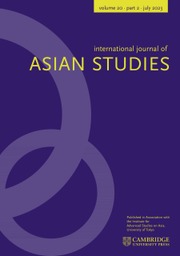Article contents
Empire, sociality, and political economy in colonial Bengal
Published online by Cambridge University Press: 13 October 2020
Abstract
How to conceptualize the broad dissemination of economic concepts in colonial South Asia? This article uses an essay by a mid-nineteenth-century Bengali, Peary Chand Mittra, as a point of departure to approach this problem in South Asian historiography. In the first part, the essay locates the conditions of possibility for Mittra's political-economic analysis of Bengal's agrarian social order within an imperial and commercial space of extended interdependencies. The aim is not to explain the specificity of Mittra's politics so much as to highlight his recourse to political-economic concepts to ground his analysis. In the second part, the essay suggests that the grounding of political economy's colonial histories within histories of imperial space needs to be supplemented by closer attention to new normative impulses and aspirations emerging directly from agrarian society in the region. This second emphasis provides better grounds for grasping the depth and durability of political economy's reach into political and ethical claims across social space in the Subcontinent in the twentieth century. It thus broaches the necessity of subaltern histories of political economy.
- Type
- Featured Essays on the History of Political Economy in Asia and Europe
- Information
- Copyright
- Copyright © The Author(s), 2020. Published by Cambridge University Press
References
- 3
- Cited by



